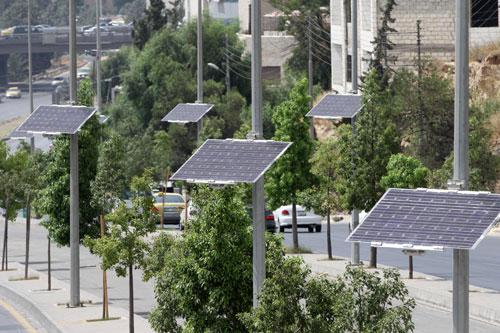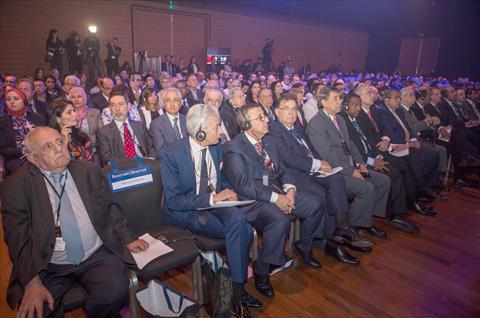You are here
‘Jordan needs to start manufacturing its own renewable energy storing technology’
By Renad Aljadid - Mar 29,2018 - Last updated at Mar 29,2018

Solar panels are seen on a street in Amman (Photo by Osama Aqarbeh)
AMMAN — Jordan should "catch the train" and begin planning for manufacturing its own renewable energy storing technology, former energy minister Malek Kabariti, said on Monday.
In a forum held by the Abdul Hameed Shoman Foundation in partnership with the Arab Forum for Environment and Development, Kabariti discussed the opportunities and challenges of the renewable energy sector in Jordan.
The storage of generated power is a crucial issue, according to the former minister, who said, "wind and sun are not available at the level needed to generate power around the clock and throughout the year."
"There are international high-quality technologies that exist for energy storage but the current manufacturing quantity is still insufficient to cover the world's high demands," Kbariti stated, pointing out that Jordan also suffers from deficiencies in the implementation of decisions in this sector.
"In 2012, the National Electric Power Company issued a recommendation to implement the 'green corridor' technology to allow the current electricity network to be connected with solar cells. A decision to implement this technology was issued in December 2012, but it has still not been executed until now," Kabariti explained.
Ibrahim Abduljalil, an Egyptian expert in renewable energy, spoke of the sector's contribution in the region, highlighting that the Arab world's location in the "Sun Belt" provides it with a rich source of renewable energy, an industry with a high potential for job creation and innovation
"Climate change, security and political concerns, as well as unequal access to power are some of the main challenges facing the Arab world nowadays, therefore preventing a better utilisation of its energy sources," Abduljalil stated.
The costs of renewable energy technologies are no longer an obstacle, according to Abduljalil, who stressed that "renewable energy is now highly competitive in terms of cost and efficiency compared with fossil fuels".
Noting that Jordan was "the first country in the region to set a legal framework regulating the investments in the renewable energy sector", moderator of the discussion Ruba Zubi warned "carbon dioxide emissions in the Arab world will increase by two-fold between 2012 and 2050 unless serious measures are taken to achieve more progress in the renewable energy sector."
Kabariti concluded the forum by outlining the major renewable energy projects implemented in Jordan so far, which fall under two main categories of investment: establishing power generation plants from the sun and wind sources and installing solar systems on the roofs of houses and buildings.
Jordan ranked the 3rd country in the Arab world after Morocco and Egypt in renewable energy capacity, according to an infographic on the state of sustainable energy capacities in the region issued recently by the Friedrich Ebert Foundation.
The Kingdom showed the highest photovoltaic capacity in the region, according to the report, which also ranked Jordan first in renewable energy resources per capita when only non-hydropower energies were considered.
The regional picture appeared to be less optimistic, with the total renewable energy generation capacity in the Arab world standing at just over 6 per cent of its total electricity generation capacity, below the 2014 global average of 22.8 per cent.
Related Articles
AMMAN — The Jordan Chamber of Commerce (JCC) will organise the participation of a private sector delegation to the Arab-Brazilian Economic F
AMMAN — Jordan and the UAE have significantly advanced their bilateral ties across various fields, particularly in climate and environmental
AMMAN — Brazilian President Michel Temer on Monday voiced his country's interest for Jordan to join the Mercosur, a South American trade blo

















